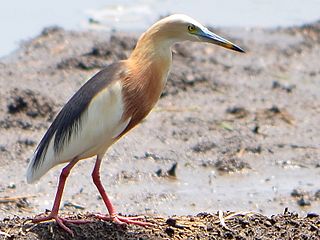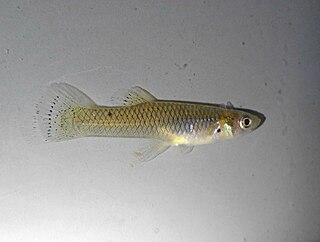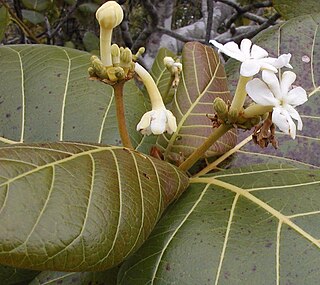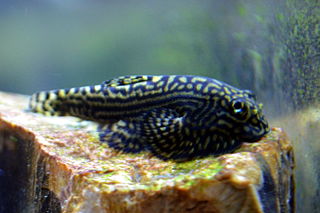
Mackerel is a common name applied to a number of different species of pelagic fish, mostly from the family Scombridae. They are found in both temperate and tropical seas, mostly living along the coast or offshore in the oceanic environment.

Herring are forage fish, mostly belonging to the family of Clupeidae.

The hillstream loaches or river loaches are a family, the Balitoridae, of small fish from South, Southeast and East Asia. The family includes about 202 species. They are sometimes sold as "lizardfish" or "flossensaugers". Many of the species are popular for aquaria, species in the genus Sewellia are most commonly sold in the aquaria trade. They have a number of similarities with the Cobitidae, their sibling family of "loaches", such as multiple barbels around the mouth. They should not be confused with the loricariids, which look similar but are a family of catfish.

The Chinese pond heron is an East Asian freshwater bird of the heron family, (Ardeidae). It is one of six species of birds known as "pond herons". It is parapatric with the Indian pond heron to the west and the Javan pond heron to the south, and these three are presumed to form a superspecies. As a group they are variously affiliated with the squacco heron or the Malagasy pond heron. As of mid-2011 there are no published molecular analyses of pond heron interrelationships and osteological data is likewise not analyzed for all relevant comparison taxa.

Parkia speciosa, the bitter bean, twisted cluster bean, sator bean, stink bean, or petai is a plant of the genus Parkia in the family Fabaceae. It bears long, flat edible beans with bright green seeds the size and shape of plump almonds which have a rather peculiar smell, similar to, but stronger than that of the shiitake mushroom, due to sulfur-containing compounds also found in shiitake, truffles and cabbage.

The Javan pond heron is a wading bird of the heron family, found in shallow fresh and salt-water wetlands in Southeast Asia. Its diet comprises insects, fish, and crabs.

The black-polled yellowthroat is a species of bird in the family Parulidae.

Gambusia speciosa, the Tex-Mex gambusia, is a species of fish in the family Poeciliidae which is found in the United States and Mexico. In Mexico its range covers the states of Chihuahua, Coahuila, Nuevo León and Tamaulipas while in the United States it is found in New Mexico and Texas. In Texas it is restricted to the Devils River and its tributaries in Val Verde County. The habitat of the Tex-Mex gambusia includes springs, outflow channels, marshes and the margins of small to medium-sized streams. This species was described by Charles Frédéric Girard in 1859 with the type locality given as the Río San Diego, near Cadereita in Nuevo León.

Guettarda speciosa, with common names sea randa, or zebra wood, is a species of shrub in the family Rubiaceae found in coastal habitats in tropical areas around the Pacific Ocean, including the coastline of central and northern Queensland and Northern Territory in Australia, and Pacific Islands, including Micronesia, French Polynesia and Fiji, Malaysia and Indonesia, Maldives and the east coast of Africa. It reaches 6 m in height, has fragrant white flowers, and large green prominently-veined leaves. It grows in sand above the high tide mark.

Sewellia is a genus of fish in the family Gastromyzontidae. They are commonly called hillstream loaches and are found in Laos and Vietnam. According to Roberts (1998) a possible defining characteristic of the genus Sewellia is their posterior pelvic valve is highly complex and different from other rheophilic loaches, their posterior pelvic valve involves the overlapping of the second to last ventrally exposed rays. Adapted to high velocity streams, Sewellia have depressed body shapes that are laterally expanded, thus increasing their hydrodynamical properties and allowing them to better stay attached to rocks in swift current. Sewellia also have paired fins with a single simple ray and numerous branched rays allowing them to grip rocks in swift current.

Austroaeschna speciosa is a species of dragonfly in the family Telephlebiidae, known as the tropical unicorn darner. It is known to be present only in the mountainous regions of north-east Queensland, Australia. It appears very similar to the more widespread Austroaeschna unicornis which inhabits areas in southern Queensland, New South Wales, Victoria and Tasmania.

Sewellia lineolata, the reticulated hillstream loach, is a species of fish from the provinces of Thua Thien-Hue, Quang Nam, Quang Ngai and Binh Dinh in Vietnam.
Sewellia hypsicrateae is a species of fish in the genus Sewellia. The fish was first described in the Dakrong River in 2016.
Sewellia albisuera is a species of fish in the genus Sewellia. The fish is only found in Vietnam and is 6.4 cm (2.5 in) long (SL).
Sewellia breviventralis is a species of fish belonging in the family Gastromyzontidae. The fish is only known in Vietnam and reaches up to 5.1 cm (2.0 in) long (SL).
Sewellia diardi is a species of fish belonging in the Gastromyzontidae family. The fish is found in Laos, the fish is 7.2 cm (2.8 in) long (SL).
Sewellia elongata is a species of fish in the genus Sewellia. The fish is found in the Se Kong River and is 7.3 cm (2.9 in) long (SL).
Sewellia pterolineata is a species of fish in the genus Sewellia. The fish is found in the Trac Khuc River and is 4.4 cm (1.7 in) long (SL).
Sewellia marmorata is a species in the Sewellia genus. The fish is highly territorial and is only found in Vietnam. The fish maximum length is 6.4 cm (2.5 in) long (SL).
Sewellia patella is a species of fish belonging to the Gastromyzontidae family. The fish is found in Vietnam and the maximum length for the fish is 4.8 cm (1.9 in) long (SL).











